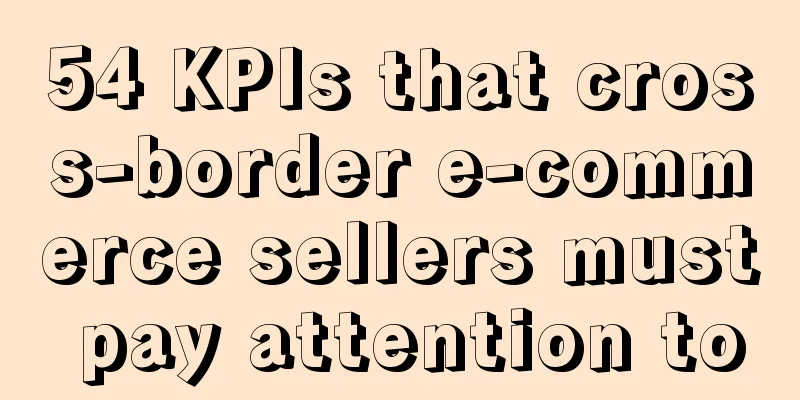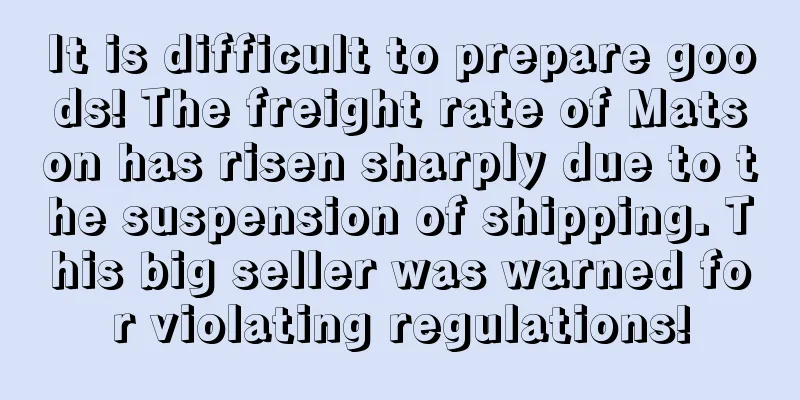54 KPIs that cross-border e-commerce sellers must pay attention to

|
KPI is an e-commerce seller’s best friend, allowing you to understand store traffic, sales, customer service and marketing performance. KPI can be qualitative or quantitative, and can understand future development directions as well as reveal past performance. Generally speaking, e-commerce KPIs can be divided into the following categories:
Marketing KPIs Marketing KPIs refer to the performance indicators of advertising marketing, and they include: 1. Affiliate Performance Rates To understand the effectiveness of affiliate marketing, you must track this KPI. Indicators include sales or traffic brought by affiliate marketing. 2. Average Position Through this indicator, you can know whether the paid search and SEO are effective. 3. Blog Traffic In Google Analytics, you can see the traffic to a specific blog, which is a useful metric for e-commerce content marketing. 4. Bounce Rate It refers to the percentage of users who exit after visiting a store or blog page. 5. Clicks The number of clicks on a specific web page, such as advertising pages, e-marketing pages, backlinks, etc. 6. CTR Averages The average click-through rate of your advertising campaigns can help you understand which ones need to be optimized. 7. Day Part Monitoring This indicator can help you understand the website's traffic peaks or sales peaks. 8. Email Open Rate A metric to measure the effectiveness of email marketing 9. Email Subscribers It is recommended not only to count the number but also to segment the users.
10. Initiated Chat Sessions Track how many people are using chat tools, which can build buyer trust and handle product issues in real time, thereby reducing shopping cart abandonment and increasing conversions. 11. New vs. Returning Visitors By comparing the number of first-time visitors and the number of returning visitors, it can measure the effectiveness of remarketing. A high number of returning visitors indicates a good remarketing effect. 12. Mobile Traffic As mobile shopping takes off, you’ll want to keep a close eye on this metric and adjust your marketing strategy and website optimization as needed. 13. Page views The average number of pages viewed per user. The higher the number, the higher the traffic. 14. PPC Traffic Volume Monitor the performance of your ads by looking at the indicators. 15. Product Review Quality and Quantity This is an indicator of improving evaluation strategies and building trust. 16. Session Duration Average The longer the average visit time of each user, the more attractive your store is. 17. Site Traffic The total number of visits the store received. 18. Social Follows and Likes If you want to increase customer loyalty and brand awareness, this is the metric to track. 19. Social Media Engagement Social media followers or engagement with paid content. 20. Text Subscribers Many sellers are testing SMS marketing. This indicator can help you understand the number of users who have subscribed to SMS. 21. Time on Site If you want to understand the engagement of your blog and promotional landing pages, then track this metric. 22. Traffic Source This is a metric for evaluating which channels are bringing you traffic and user behavior. 23. Unsubscribes Not only should you assess the percentage of unsubscribes, but you should also understand the total number. Sales KPI 24. Average Order Size The average amount spent per order. 25. Churn Rate The percentage of customers that churn during a specific period of time. If the acquisition rate is higher than the churn rate, it means that the business is doing well.
26. Competitor Pricing Don’t forget to monitor your competitors’ pricing. 27. Conversion Rate The proportion of visiting users who have completed transactions. 28. CAC (Customer Acquisition Cost) Divide your marketing costs by the number of customers acquired over a period of time. If you want to reduce costs and increase sales, then monitor this metric. 29. Cart Abandonment Rate The goal of sellers is to minimize car purchase abandonment rates. 30. CLV (Customer Lifetime Value) To calculate this indicator, you can use the following method:
31. COGS (Cost of Goods Sold) A measure of manufacturing and other indirect costs of a product. 32. Gross Profit Sales minus total product costs equals gross profit. 33. Inventory Levels A measure of inventory volume, inventory duration, and sales rate. 34. Margin Average The gross profit margin of a store or product over a period of time. 35. New vs. Returning Customer Orders Compare the order amounts of new and returning customers. 36. Number of Transactions It can be used together with other indicators such as average order amount to improve business. 37. Product Affinity This metric refers to products that are often purchased together. Use it to optimize your cross-selling strategy. 38. Product Relationship This metric mainly shows the products that are viewed continuously. To obtain this KPI, you can use Google’s Behavior Flow report. 39. RPV (Revenue Per Visit) This measures the average spend per visitor per visit. 40. Sales The most commonly used KPI calculates the total sales within a specific period of time, such as daily, monthly, etc. 41. Total Market Available This refers to the market share you have. Supply Chain KPIs These KPIs can help you monitor manufacturing and production efficiency. 42. Cycle Time This refers to the time required to complete a product in the production line process. 43. First Time Yield The formula for calculating this KPI is total finished product divided by input. 44. Number of Non-Compliance Events This is an indicator that counts the number of accidents that cause safety, quality or work environment problems. 45. Overall Equipment Effectiveness It is a key indicator for monitoring the performance of manufacturing equipment. 46. Overall Labor Effectiveness This is a metric to monitor employee efficiency. 47. Yield Find out how many products were produced over a period of time. Customer Service KPIs 48. Average Resolution Time The average time it takes for the customer service team to resolve a customer's issue. 49. Customer Satisfaction Score This is the most important customer service KPI, which is usually derived from a customer survey within a certain range. 50. Customer Service Count Usually refers to the average number of customer service requests per channel. 51. First Response Time The average time it takes to respond to a customer for the first time. 52. Hit Rate The sales volume of a product divided by the number of customers who inquired about the product is the hit rate. 53. Net Promoter Score This is a way to understand how likely a customer is to recommend a product. 54. Service Escalation Rate It refers to the number of times users request to speak to a more senior person. Generally, the lower the better, and a high ratio indicates that the customer service team cannot handle the problem effectively. As you can see from the above list, there are countless KPIs for e-commerce. All KPIs have their own importance, but you can start by focusing on the following indicators first, and then optimize your store with other indicators as your business grows further:
Text ✎ Mary/ Statement: When reprinting this article, the title and original text must not be modified, and the source and original link must be retained. |
<<: 12 Free Tools Amazon FBA Sellers Must Collect
>>: How to master YouTube influencer video marketing?
Recommend
How to grab Amazon’s internal related traffic?
1. Detailed explanation of the traffic entrance wi...
Amazon frequently attacks you by forcing banned words into your products!
Recently, sellers have revealed that their produc...
What is Salesbacker? Salesbacker Review
Salesbacker is an automated email sending tool for...
Multiple products failed! More than 400 sellers sued
Welcome to the new column - [Infringement Warning...
What is Accton? Accton Review
Beijing Zhibang International Software Technology ...
US Probiotic Supplement Market Insights: Amazon and AliExpress Account for More Than 35% of the Market Share!
<span data-shimo-docs="[[20,"获悉,根据在线食品研究机构...
What is Zhimomo Intellectual Property? Zhimomo Intellectual Property Review
Zhimomo (Zhimo Intellectual Property Operation (Gu...
What is Wish Local? Wish Local Review
Wish Local sells second-hand goods (about 80% new)...
What is Akulaku? Akulaku Review
Akulaku is an installment shopping e-commerce plat...
A summary of the basics of Amazon advertising
Before analyzing the problem, let’s once again em...
Following the example of Amazon and Walmart! Target launches paid membership service!
According to foreign media reports, the US retail ...
There are no bugs on Prime Day! Your payment collection may be in trouble
Half of the 48 hours of Primeday has passed, and ...
The exchange rate broke 7 but the price war is still going on! Will the sellers be banned for violating the rules and selling at low prices?
▶ Video account attention cross-border navigation ...
What is GlobalImporter? GlobalImporter Review
GlobalImporter (Transnational Purchasing Network, ...
What is Kylin Cloud? Kylin Cloud Review
Kylin Cloud is a cross-border e-commerce platform ...









